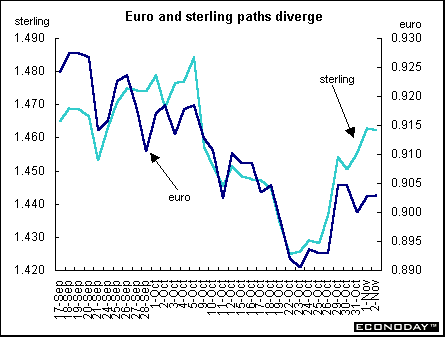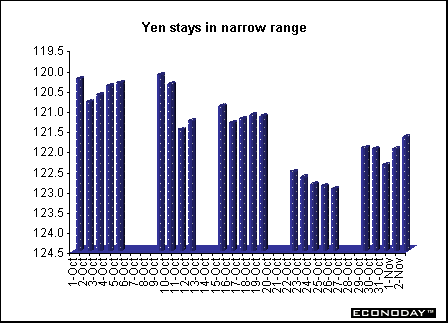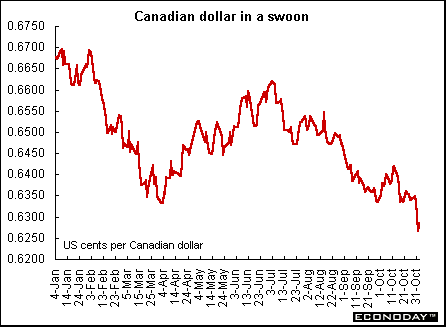
Currencies
The euro once again failed to take advantage of the weakening U.S. economy and traded within a narrow range. Investors still think that if the U.S. economy is doing badly, European economies will do worse. The euro is more affected by the inaction of the European Central Bank to ease interest rates further. And with the member countries governments stymied on the fiscal side because of the stability pact agreement, which sets a limit on deficits, there is very little maneuvering space left for stimulus.

Sterling jumped in value because the U.K. is performing better than Europe or the United States. Preliminary third quarter GDP figures showed that the economy rose 0.6 percent in contrast to the U.S.'s decline.
The yen continues to stay within a narrow range despite reports that Japan continues to worsen. Delays in implementing measures to rectify structural and debt problems have not helped. And the relatively strong yen, which makes Japanese goods more expensive overseas, continues to hurt exporters' profits. Now parliament wants to pass a law requiring the Bank of Japan to set a two percent inflation target. The thinking is that this will stop the deflationary spiral. The Bank of Japan strongly disagrees.

The proposal highlights a struggle between Japan's central bank and politicians over which side can and should take action to pump up a rapidly deteriorating. The BOJ would have to set a price target under the legal revision just like Europe and also set a deadline for achieving the target.
The Bank of Japan argues that it has no more room to maneuver, that the government must implement painful reforms to turn the economy around. But politicians say the central bank must make more of an effort to bring deflation under control. Targeting a level for inflation, they say, would help resolve the economically damaging problem. The central bank's governor, Masaru Hayami, maintains inflation targeting is not the answer to deflation. The legislation would also permit the central bank, in its daily operations, to buy stocks and foreign government bonds held by investors residing in Japan.
The Canadian dollar touched another record low on Friday for the third session in a row, but was able to rebound, partly buoyed by a firmer than expected Canadian jobs report. The Canadian dollar lost more than one percent of its value this week as it shouldered a growing burden of global economic uncertainty. The currency has been dealt several blows this week as economic weakness south of the border is expected to spill eventually over into Canada. The close trading relationship between the two countries is worth more than $1 billion a day.

The Canadian dollar has been undermined by the weak growth outlook in the United States, which is Canada's largest trading partner. Disappointment that the Canadian dollar failed to rally after last week's surprise 75 basis point cut by the Bank of Canada has also weighed on the currency. Deteriorating fundamentals such as a slowing economy and slumping global commodity prices had long held out the possibility for such a move, though it had been delayed in recent weeks by a modest but steady Canadian dollar bid from sales of Canadian energy companies to U.S. interests, which created currency conversion needs in Canada's favor.


Introduction • Global Stock Market Indexes • Recap of Global Markets • Currencies • Indicator Scoreboard

The Bottom Line • Looking Ahead
|